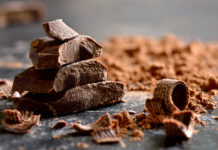Ordinary vinegar – acetic acid – may prevent the build up of fat, and therefore weight gain, according to results of a study with mice from Japan. Animals fed a high-fat diet and supplemented with acetic acid developed about 10 percent less body fat than mice just eating the diet, according to findings published in the Journal of Agricultural and Food Chemistry.
If the results can be repeated in further studies, particularly in human studies, it could see vinegar establish itself in the burgeoning weight management market, estimated to be worth about $3.93 billion in the United States in 2005.
The Japanese researchers, led by Tomoo Kondo from the Central Research Institute of the Mizkan Group Corporation, found that vinegar was working at a genetic level, by influencing genes linked to fatty acid oxidation and heat-generating (energy burning) proteins.
“We intend to perform further clinical studies to confirm fat pad reduction and energy consumption enhancement by vinegar intake. Moreover, we will investigate the effect of acetic acid on fatty oxidative activation in other organs, particularly skeletal muscles,” wrote the researchers.
This is not the first time vinegar has been linked to weight control. In 2005 scientists from Lund University reported that increasing intake of the common flavoring could help dieters eat less and reduce cravings brought on by sugar peaks after meals (European Journal of Clinical Nutrition, Vol. 59, pp 983-988).
Study Details: Kondo and co-workers fed mice a high-fat diet, with 50 percent of energy coming from fat, and treated the animals the animals with 1.5 percent vinegar (high-dose group), 0.3 percent vinegar (low-dose group), or water (control group).
At the end of the study, the researchers noted that both vinegar groups produced reductions in fat mass of about 10 percent, with no apparent dose-dependent effect, compared to the control mice.
Furthermore, the researchers noted changes in the gene-expression of peroxisome-proliferator-activated receptor-alpha (PPAR-alpha), which controls enzymes linked to fatty-acid-oxidation, such as acetyl-CoA oxidase and carnitine palmitoyl transferase-1, as well as a protein linked to thermogenesis called uncoupling protein-2.
“The results of this study suggest that acetic acid suppresses body fat accumulation by increasing fatty oxidation and thermogenesis in the liver through PPAR-alpha,” wrote the researchers.
Source: T. Kondo, M. Kishi, T. Fushimi, T. Kaga, Journal of Agricultural and Food Chemistry, ASAP Article, doi: 10.1021/jf900470c, “Acetic Acid Upregulates the Expression of Genes for Fatty Acid Oxidation Enzymes in Liver To Suppress Body Fat Accumulation.”














[…] en het bevordert de omzetting naar warmte. Een lepeltje (15 milliliter) is genoeg om af te vallen, een slankere taille te krijgen, betere bloedwaarden en minder (gevaarlijk) buikvet. Azijn […]